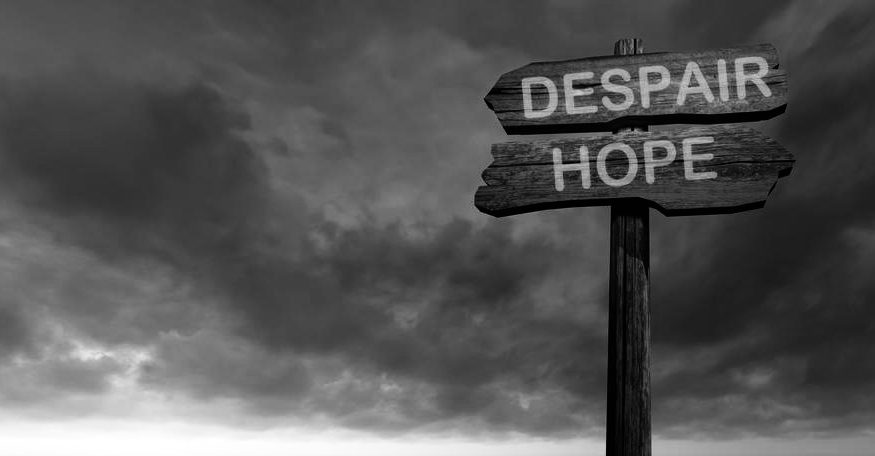On Hope and Despair (Part II)
13 May 2024
In the previous post, I raised the possibility that people can hope without hope, that is, hope for things that they simultaneously despair or feel unhopeful about. Far from being a contradiction, I defended this possibility on the basis that hope has two different senses – hoping and being hopeful. Since each of these senses refers to a distinct mental phenomenon, a person can therefore hope for a desired outcome but at the same time be unhopeful about it.
Hoping without hope is an important way of hoping for things. It allows people in awful and difficult situations to hope or to maintain their hope for things integral to their survival, identities or notions of a good life. Many who live under oppressive conditions, for instance, hope – and the need to hope – that they will live a life free from poverty and violence. But this kind of hoping, it must be emphasized, is anything but rosy or upbeat. Rather, it is a sober and realistic kind of hoping, and can be quite demoralizing and torturous. People who hope without hope are well aware of the pitfalls and obstacles that stand between them and the outcome that they so eagerly desire. Although they acknowledge that these pitfalls and obstacles can in theory be overcome, they simply cannot see any way in which that can happen. That is why they despair while hoping.
Hoping without hope therefore also represents a loss or absence of hope. Crucially, what is lost and absent is hopefulness. People who despair do not think or feel positively about the chances that their hoped-for outcomes will be realized. Instead, they are consumed by negative thoughts and feelings surrounding just how unlikely these outcomes will turn out. An important and surprising insight that has been overlooked by hope theorists but which has emerged from the present discussion is that despair presupposes hoping: A person cannot despair about a desired outcome unless they also hope for it at the same time. The reason is simple: If a person did not desire something that they believe has some chance of obtaining, there would not be anything for them to be hopeful or unhopeful about.
And that can and often does happen. People can cease believing that an outcome they desire has a chance of being realized. But when this happens, I contend that they will have lost hope in a very different way than those who are not hopeful: They would no longer hope for the outcome. This of course does not mean that they no longer desire the outcome; they may well continue to do so. However, since they don’t believe, not even on paper, that the outcome has any chance of obtaining, they stop hoping for it. Given that they lack the mental attitude of hoping, they are, in this sense, hopeless.
In everyday language, hopelessness and despair are for the most part treated as synonyms and used interchangeably to refer to a loss of hope. Many dictionary entries define them in terms of one another; the Oxford English Dictionary, for instance, lists “feeling despair” as a meaning of hopelessness. But as I have shown, hope can be lost or absent in two distinct ways. In order to capture them, my preference is to use ‘despair’ to refer to the absence of hopefulness, and ‘hopelessness’, to the absence of hoping.
This distinction matters, for doing so has important practical applications. For example, if we are interested in helping people recover hope, we need to know in which sense they have lost hope, i.e., whether they have stopped hoping for some outcome (hopelessness) or they have stopped being hopeful about its being realized (despair). This is because hopelessness and despair have different antidotes.
Take hopelessness first. I noted earlier that a reason people do not or no longer hope for an outcome is that they do not believe that such an outcome has any chance of obtaining. Some people, for instance, believe that it is impossible for them to be happy and so, do not hope for it. To help them recover hope, that is, to get them to hope, our general strategy would revolve around showing or persuading them that their desired outcome is not in fact an impossibility. The key is to encourage them to see, by way of evidence or argument, that it has some chance of being realized. Another reason people may experience hopelessness with respect to some outcome is that they do not desire it. In extreme cases of hopelessness, some people may not hope for anything at all. The antidote to this source of hopelessness will require a different strategy. To get them to hope, we would need to convince them that certain outcomes are valuable and worth desiring.
What about despair? Notice that neither of the above strategies is applicable in helping people in despair recover hope. Indeed, it would be quite odd to try to convince them that some outcome is worth desiring or that it has some chance of obtaining. This is because people who despair already desire the outcome in question and believe that it has some chance of happening. In fact, it is precisely because they desire it and believe that it is a possibility that they despair. Despair therefore calls for a different remedy. To spark hopefulness in the despairing, what we would need to do is to inspire them to see new ways in which their desired outcomes can be realized. If the source of their despair is that they have no way of seeing how they can cross the chasm that separates them from their desired outcome, our goal would be to stir them into drawing up a mental bridge.
No doubt a lot more remains to be said about the main cast of these posts: hoping, hopefulness, despair and hopelessness. But I hope – and am hopeful – that I have shown that taking the two distinctions I have been urging seriously opens up exciting and surprising possibilities for those who want to recover hope and those who want to be better hopers.
- October 2025
- September 2025
- August 2025
- July 2025
- June 2025
- May 2025
- April 2025
- March 2025
- February 2025
- January 2025
- December 2024
- November 2024
- October 2024
- September 2024
- August 2024
- July 2024
- June 2024
- May 2024
- April 2024
- March 2024
- February 2024
- January 2024
- December 2023
- November 2023
- October 2023
- September 2023
- August 2023
- July 2023
- June 2023
- May 2023
- April 2023
- March 2023
- February 2023
- January 2023
- December 2022
- November 2022
- October 2022
- September 2022
- August 2022
- July 2022
- June 2022
- May 2022
- April 2022
- March 2022
- February 2022
- January 2022
- December 2021
- November 2021
- October 2021
- September 2021
- August 2021
- July 2021
- June 2021
- May 2021
- April 2021
- March 2021
- February 2021
- January 2021
- December 2020
- November 2020
- October 2020
- September 2020
- August 2020
- July 2020
- June 2020
- May 2020
- April 2020
- March 2020
- February 2020
- January 2020
- December 2019
- November 2019
- October 2019
- September 2019
- August 2019
- July 2019
- June 2019
- May 2019
- April 2019
- March 2019
- February 2019
- January 2019
- December 2018
- November 2018
- October 2018
- September 2018
- August 2018
- July 2018
- June 2018
- May 2018
- April 2018
- March 2018
- February 2018
- January 2018
- December 2017
- November 2017
- October 2017
- September 2017
- August 2017
- July 2017
- June 2017
- May 2017

